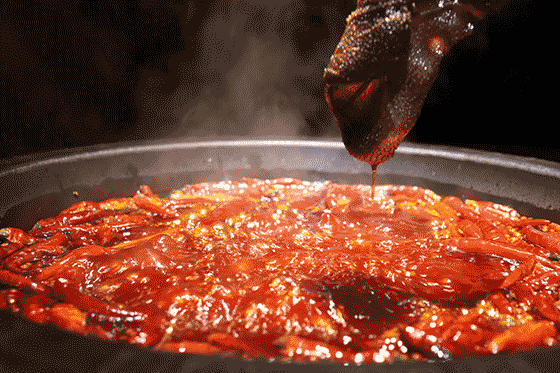
The weather is getting cooler day by day, and foodies have a lot more choices. On a good day, you can start with some spicy crayfish as an appetizer:

What is unhappy? Then there is no one meal that can’t be solved by hot pot. If one meal really doesn’t work, then two meals:

However, some people are still aftertaste after eating spicy, and suddenly their stomachs are overwhelmed… they are going to have diarrhea!
In fact, many people have such experience, eating spicy diarrhea, diarrhea after nervousness, cold. so, what happened?
Next, let us explain one by one.
Why do people have diarrhea when they eat spicy food?
Pepper contains a component called “capsaicin”, which binds to the “capsaicin receptor” in the body after it enters the body. Too much capsaicin cannot be completely broken down and metabolized by the digestive tract.
Therefore, when the “capsaicin receptor” is activated, in order to expel capsaicin from the body quickly, the gastrointestinal peristalsis speeds up. However, the gastrointestinal tract suddenly “speeds up” while being unable to take into account the “regularity of movement”, resulting in irregular gastrointestinal peristalsis, disorder of intestinal motility, and irregular bowel movements.

The feces stay in the intestines for a shorter time than normal, and the water in the feces is absorbed by the intestines less, which causes the feces to be too thin and not formed, and the symptoms of “diarrhea” appear.
Moreover, the activation of the “capsaicin receptor” activates the pain nerve conduction pathway and transmits a “burning sensation”. This is the reason why we sometimes have “snot and tears” when we eat spicy food.
In addition, our intestines have a large and diverse flora. Under normal circumstances, there are more beneficial bacteria and fewer harmful bacteria in the intestinal tract, and the intestinal flora is in a “balanced state”.
When the intestine is stimulated (such as intense cold and heat stimulation, spicy and greasy stimulation, or overworked body), it will cause the intestinal flora to be imbalanced, causing diarrhea, constipation and other indigestion symptoms.
Of course, the reaction after eating spicy food has a lot to do with each person’s physique. In life, some people are “spicy and fearful” while others are “unspicable and unpleasant”. This is mainly related to personal physique and living habits.

For people who often eat spicy food in their lives, the occasional diarrhea after eating spicy food will gradually relieve over time, and the symptoms are relatively mild.
For people with intestinal irritability syndrome, there are more “capsaicin receptors” in the intestine that can bind to capsaicin. Therefore, these people will be more prone to diarrhea and more severe symptoms after eating spicy food.
Why do I have diarrhea when I catch a cold or get nervous?
In fact, not only eating spicy food can cause diarrhea, but many people also experience diarrhea when they are cold or nervous. In the final analysis, it is caused by the “irritation” of the stomach and intestines. These common “irritating factors” can be roughly divided into three categories, namely diet , temperature and spirit.
Food is the most common stimulating factor for diarrhea. In addition to the spicy stimulation we mentioned above, the large intake of some high-sugar foods can also promote intestinal peristalsis and cause diarrhea, especially the intake of large amounts of fruit containing fructose.
Malabsorption of fructose is more prone to diarrhea. There are also fried foods, high-protein foods or caffeine, etc., and large amounts of intake may cause symptoms of diarrhea.
Diarrhea caused by temperature stimulation is also more common. Because different from skin nerves, relative to cutting pain, gastrointestinal nerves are more sensitive to pain caused by stimuli such as stretching, cold and heat.

Especially in our belly button, the skin is thin, and there is no muscle or fat tissue under the navel. It is more susceptible to cold and induce irritable bowel syndrome, which can lead to abdominal pain, diarrhea and other uncomfortable symptoms.
Mental factors can also cause diarrhea. Because there is a neural structure independent of the central nervous system in the human gastrointestinal tract, it is closely connected with the central nervous system and interacts with each other. We call this “emotional line” connecting the brain and the intestines the “brain-gut axis”.
When we have bad emotions such as tension, anxiety, and anger, this emotional signal will be transmitted to the gastrointestinal tract through the “brain-gut axis”, affecting the peristalsis of the gastrointestinal tract, and symptoms of indigestion appear.

In addition, there are other reasons that may also cause diarrhea, such as bacterial or viral infections, excessive drinking, drug abuse, and so on. Therefore, if the symptoms of mild diarrhea cannot be relieved in time, you should seek medical attention in time to find out the cause and prescribe medicine.
What should people who have diarrhea pay attention to?
In order to ensure the health of the gastrointestinal tract, we have the following suggestions:
Eating moderation: Try to avoid eating some fried or high-fat foods, and reduce the degree or frequency of spicy food. Eat regularly, avoid overeating, and try to eat fresh food.
Moderate cold and heat: Keep warm in daily life, especially in areas that are susceptible to cold such as the navel. Avoid eating foods that are too hot or too cold. Avoid alternating hot and cold during meals (such as hot pot + iced drinks).

Relax your mood: Look for good ways to relieve stress (such as writing a diary, talking to friends, etc.), and deliberately cultivate your own ability to stabilize your emotions.
Strengthen exercise: develop the habit of regular exercise, improve the blood circulation of the gastrointestinal tract, and enhance the body’s immunity.
Comments